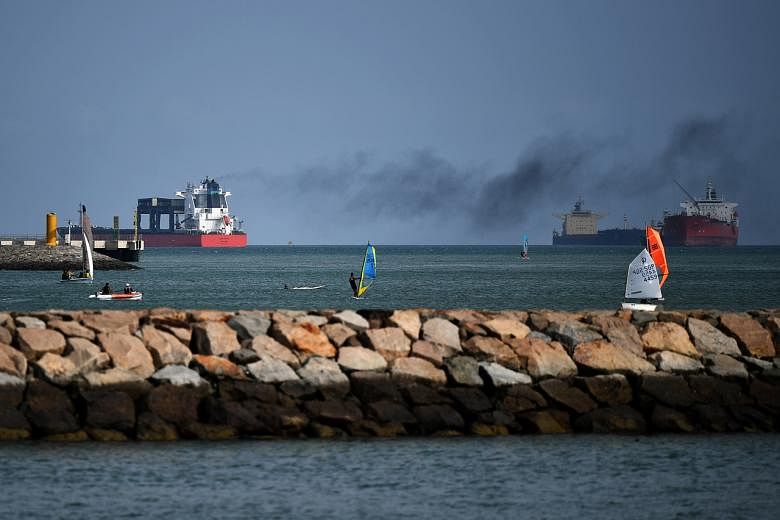GLASGOW - Singapore will not be spared the impacts of climate change, which is why the outcome of the COP26 climate summit is something the Republic must pay attention to, said Minister for Sustainability and the Environment Grace Fu on Saturday (Nov 13).
Speaking to Singapore media on the outcome of the United Nations (UN) climate talks in Glasgow, Scotland, she added: "The discussion here today will require us to take more action. There are some obligations as a party under this agreement, we have to do our part."
For instance, as part of the deal, nations are requested to revisit and strengthen their 2030 climate targets to align with the Paris Agreement temperature goal by the end of next year.
Under the Paris Agreement, countries should take steps to limit global warming to well below 2 deg C - preferably 1.5 deg C - above pre-industrial levels.
Climate scientists have shown that this threshold will help the world avoid harsher climate impacts, which become more severe with every degree of warming.
Singapore's current target is for its emissions to continue to increase until 2030, when they reach their peak, before they start to decline.
But the United Nations has recommended that for the world to have a better chance at limiting warming to the 1.5 deg C target, emissions must be nearly halved by 2030 from 2010 levels, and reach net-zero by 2050.
The 2022 review of national climate pledges is part of the deal that almost 200 nations, including Singapore, on Saturday agreed on to step up efforts to avoid dangerous climate change.
The deal, dubbed the Glasgow Climate Pact, was gavelled through by COP26 president Alok Sharma after negotiations ran more than a day overtime as countries sought to find common ground on thorny issues such as carbon markets and climate finance.
The deal is significant as it means the 2015 Paris Agreement can now be taken off its training wheels to go full steam ahead - with rules in place to guide governmental policies that will help to limit global warming to 1.5 deg C above pre-industrial levels.
Ms Fu said Singapore recognises its obligation and responsibility under the latest pact to review its climate pledge.
"We'll definitely do our part to comply with the requirements," she added, noting that the Government will also take into consideration the potential that carbon markets can offer the Republic.
The Straits Times reported last month that Singapore is considering buying carbon credits to help reduce its carbon footprint, although it will prioritise domestic efforts first, such as encouraging industrial energy efficiency.
Rules governing carbon markets, which will allow countries to buy carbon credits to meet their climate targets, are also part of the Glasgow Climate Pact.
Ms Fu said the region will not be spared the impacts of climate change - whether they are increasingly intense tropical cyclones or erratic rainfall patterns.
"This will have an impact on important issues such as food security, food supply and water around us," she added. "It has real serious implication for properties. And you've seen how devastating some of these extreme weather events can be on the lives of people and also loss of properties."
She added: "There must be an appreciation in Singapore about the impact of climate change. We must convince and encourage Singaporeans to take collective action. "
The 1.5 deg C warming threshold is one of the key aims set out under the 2015 Paris Agreement, alongside other targets that include the channelling of climate finance from developed to developing nations, and the establishment of international carbon markets.
But the agreement did not specify how these aims can be translated into action.
On Saturday, the final pieces of this action plan were put in place when COP26 came to a close.
The Glasgow climate pact calls on countries to "phase down" the use of unabated coal, which is the most pollutive of fossil fuels, and urges developed nations to at least double finance for adaptation in developing countries.
Adaptation measures, such as the building of sea walls or planting weather-resilient crops, are strategies that nations can take to reduce the impacts of climate change on their societies and economies.
The deal also involves agreements on how transparent countries should be when reporting their progress in taking climate action, as well as those governing carbon markets.
A number of pledges were also inked on the sidelines of COP26, including those to reduce the amount of methane emissions and halt deforestation.
Ms Fu said: "Many of the agreements that we have signed, we have all the intention to see them through."
The methane pledge, for instance, is a signal to all industries that have methane emissions, she added.
"These are all directions that the Government will take as part of the green plan," said Ms Fu, in reference to the Singapore Green Plan 2030 that charts the country's pathways to cut emissions.
"We hope to communicate this clearly to Singaporeans, to the men in the streets, to prepare them for the collective actions that are going to come."


